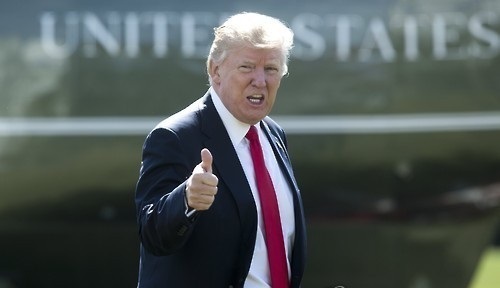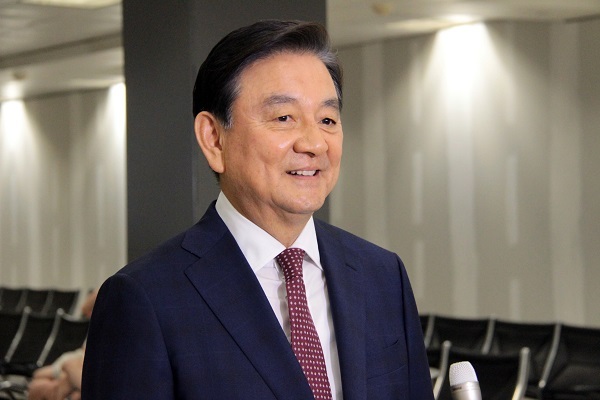Trump willing to engage NK, but stresses ‘right conditions’: envoy
By Shin Hyon-heePublished : May 18, 2017 - 16:25
US President Donald Trump said Wednesday he is willing to engage North Korea, but emphasized the “right conditions” as a prerequisite, Seoul’s special envoy said.
Hong Seok-hyun, a former chairman of JoongAng Media Network who also served as an ambassador to the US, met with Trump on his first day of a visit as President Moon Jae-in’s special envoy.
During the 15-minute talk, the sides discussed what would be the first summit between the two leaders, slated for late June in Washington. They are expected to coordinate policy on North Korea, the deployment of the US’ Terminal High Altitude Area Defense missile shield here and other key issues.
Hong Seok-hyun, a former chairman of JoongAng Media Network who also served as an ambassador to the US, met with Trump on his first day of a visit as President Moon Jae-in’s special envoy.
During the 15-minute talk, the sides discussed what would be the first summit between the two leaders, slated for late June in Washington. They are expected to coordinate policy on North Korea, the deployment of the US’ Terminal High Altitude Area Defense missile shield here and other key issues.

“(Trump) spoke about sanctions on North Korea and cooperation with China. He also said he looks forward to working closely with President Moon in resolving the North Korean nuclear issue so as to attain results,” Hong told reporters after the meeting.
“Though we’re now at the stage of pressure and sanctions, (Trump) said he is willing to build peace through engagement if certain conditions are created. But he said he will not have talks with North Korea for the sake of talks, but those that could produce an outcome.”
Hong delivered Moon’s letter, conveying the president’s gratitude for Washington’s unwavering security commitment and the early summit plan. Among other participants in the session were Vice President Mike Pence, National Security Adviser H.R. McMaster and Trump’s son-in-law and senior adviser, Jared Kushner.
The envoy dispatch set in motion Seoul’s summit diplomacy following a seven-month void that has fueled concerns that the country may be losing its voice on critical matters, including North Korea’s evolving nuclear and missile threats.

Moon’s messengers to China and Japan, senior Democratic Party of Korea lawmakers Moon Hee-sang and Lee Hae-chan, are currently in their respective mission countries. Sogang University economist Cho Yoon-jae departed for Brussels earlier in the day as the representative to the European Union and Germany, while other envoys to Russia and the Vatican are expected to begin their journeys shortly.
With about a month left before the summit with Trump, concerns have been rising over potential discord between the two leaders, due chiefly to Moon’s pursuit of a restart of dialogue with Pyongyang despite escalating international sanctions and a pressure campaign. The liberal president also seeks parliamentary approval for the ongoing THAAD stationing, for which Trump has called for Seoul to pay $1 billion.
“President Trump talked largely about the big picture and stressed that we can achieve an outcome through the strong unity of the alliance and international cooperation,” Hong said.
But the THAAD issue was not brought up at the meeting with Trump, he noted, though McMaster expressed his understanding of the related controversy in South Korea during separate talks.
“I spoke on the controversy that aroused during the deployment process, as well as the need for the National Assembly to discuss the matter,” Hong said.
“(McMaster) said he is aware of the procedural problem in South Korea and understands it.”
In Beijing, Lee said Moon may have his first face-to-face talks with Chinese President Xi Jinping on the sidelines of the Group of 20 conference in July in Hamburg, Germany.
“A first summit is possible in Hamburg, and another one around Aug. 24 to mark the 25th anniversary of the relationship’s establishment, which I plan to offer to (Xi),” he told reporters upon his landing in Beijing.
Given China’s economic retaliation over the THAAD program, he will also urge Xi’s understanding during his trip, which he said would be a chance to lay the foundation for a thaw in relations.
“Now the relations are severely strained so I will focus on resolving problems on economic exchanges, Hallyu and tourism,” Lee said.
In Tokyo, Moon Hee-sang met with Japanese Prime Minister Shinzo Abe for about 30 minutes, during which the premier expressed his resolve for “future-oriented” ties with what he called the country’s most important neighbor that shares strategic interests.
While President Moon signaled opposition to a December 2015 settlement on a wartime sex slavery row in last week’s phone call, Abe reiterated his hopes for its “steady” implementation, stressing its nature as an intergovernmental accord.
Moon said he also delivered the president’s desire for future-oriented ties, a resumption of “shuttle diplomacy” between the two leaders and greater cooperation on North Korea’s threats.
“The keyword in the president’s letter is that let’s meet often and exchange often,” the lawmaker told reporters. “I talked about the recovery of shuttle diplomacy (to Abe) and he welcomed it.”
The two leaders are also likely to meet on the margins of the G-20 summit.
Abe also raised concerns about the president’s remarks during the campaign that he would visit Pyongyang and the Kaesong industrial park first, instead of Washington, saying it may be “too hasty.” The envoy, in response, explained the precondition that significant progress should be made on nuclear issues, as well as sufficient consultations with the US and Japan, before any reconciliation with the communist state were to take place.
But Moon declined to elaborate on their discussions on the sex slavery deal or its renegotiation, though he reiterated the public sentiment that “cannot accept” the agreement during a separate session with Japanese Foreign Minister Fumio Kishida a day ago.
By Shin Hyon-hee (heeshin@heraldcorp.com)

















![[KH Explains] Hyundai's full hybrid edge to pay off amid slow transition to pure EVs](http://res.heraldm.com/phpwas/restmb_idxmake.php?idx=652&simg=/content/image/2024/04/18/20240418050645_0.jpg&u=20240418181020)

![[Today’s K-pop] Zico drops snippet of collaboration with Jennie](http://res.heraldm.com/phpwas/restmb_idxmake.php?idx=642&simg=/content/image/2024/04/18/20240418050702_0.jpg&u=)